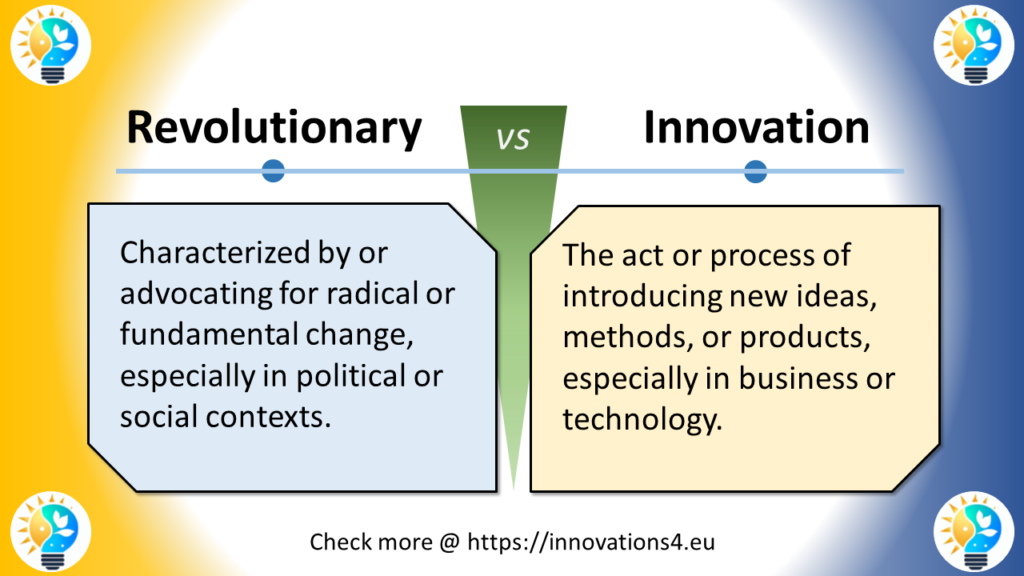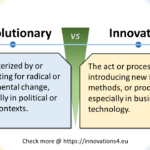
The difference between revolutionary and innovation largely hinges on the scale and impact of the change they represent.
Revolutionary implies a profound, often radical shift that marks a significant departure from previous norms or practices, fundamentally altering the status quo.
Innovation, while it can be revolutionary in nature, generally refers to the act of introducing new ideas, products, or methods that improve or replace existing ones, without necessarily overthrowing established systems.
Definition
Revolutionary
Revolutionary pertains to or involving a complete and dramatic change, often in a way that has a considerable effect on society, industry, or technology.
- Characteristics of Revolutionary:
- Drastic Change: Implies a fundamental transformation or complete overhaul.
- Break from Tradition: Represents a clear departure from established methods or ideologies.
- Impactful: Results in significant and widespread effects on existing structures or beliefs.
Innovation
Innovation involves the creation or significant enhancement of products, services, or processes, offering new value or solving problems in unique ways.
- Characteristics of Innovation:
- Novelty: Introduces something new or makes substantial improvements to what already exists.
- Implementation: Involves putting an idea into practice, often leading to increased efficiency or effectiveness.
- Value Addition: Provides benefits or solutions not previously available.
More Synonyms on innovation, innovate and innovative
Innovation Terms

Innovation is considered as a driving force in progress.
It includes the introduction of novel ideas, methods, or products that bring positive change and advancement.
For more information about innovations, check our glossary
Relationship and Relevance
A revolutionary change can encompass innovation, but not all innovations are revolutionary.
Revolutionary changes can be sparked by innovative ideas that are so transformative they disrupt the existing order. Conversely, many innovations contribute to gradual progress without necessarily being revolutionary.
The key difference between revolutionary innovation and innovation in general is:
Revolutionary innovation refers to unexpected, radical inventions that create something completely new, but do not necessarily disrupt existing markets.
Examples of revolutionary innovation include the first automobiles in the late 19th century, or the invention of the personal computer. These were groundbreaking, novel creations, but did not immediately overtake existing markets.
Innovation, on the other hand, is a broader term that encompasses different types of innovation, including:
- Evolutionary innovation - Incremental improvements and adaptations to existing products, processes or systems.
- Disruptive innovation - Innovations that create new markets and displace existing ones, often through applying a different set of values. Examples include the Ford Model T or Uber's ridesharing model.
So while revolutionary innovation refers specifically to unexpected, radical breakthroughs, innovation as a whole can take many forms - from gradual enhancements to completely transformative changes.
The key distinction is that revolutionary innovation creates something new without necessarily disrupting the status quo, while other types of innovation, like disruptive, do fundamentally change existing markets and industries.
Context for Using Each Term
- Revolutionary is often used in contexts that discuss major societal, technological, or political shifts that redefine the way things are understood or operated.
- Innovation is widely used in business, technology, and scientific contexts to describe the act of introducing new ideas or methodologies that lead to improvement or progress.
Example of Utilization
The invention of the internet was revolutionary because it fundamentally changed how people communicate, access information, and do business globally. A company that develops a new app to streamline online shopping, enhancing the user experience, is engaging in innovation.
In essence, while revolutionary signifies a sweeping, radical change that can alter the course of history or an industry, innovation refers to the process of making improvements or creating new products or services that may not necessarily be revolutionary in their impact.
- Types of Innovation
- Innovation: Revolution, Evolution, or a Combination?
- Are You Disruptive, Evolutionary, or Revolutionary?
- Model
- Innovation vs. Improvement
FAQ
Q1: Can an innovation be revolutionary?
A1: Yes, some innovations can be so significant that they lead to revolutionary changes in their respective fields or society at large.
Q2: Is revolutionary change always positive?
A2: Not necessarily. Revolutionary changes can have both positive and negative consequences, depending on the context and perspective.
Q3: How long does it take for something to be considered revolutionary?
A3: The recognition of revolutionary change can be immediate in some cases, while in others it may take time for the full impact to be understood.
Q4: Can revolutionary changes occur without innovation?
A4: While rare, revolutionary changes can sometimes occur through the recombination of existing elements rather than new innovations.
Q5: Are certain fields more prone to revolutionary changes or innovations?
A5: While both can occur in any field, rapidly evolving sectors like technology and science may experience more frequent revolutionary changes and innovations.

